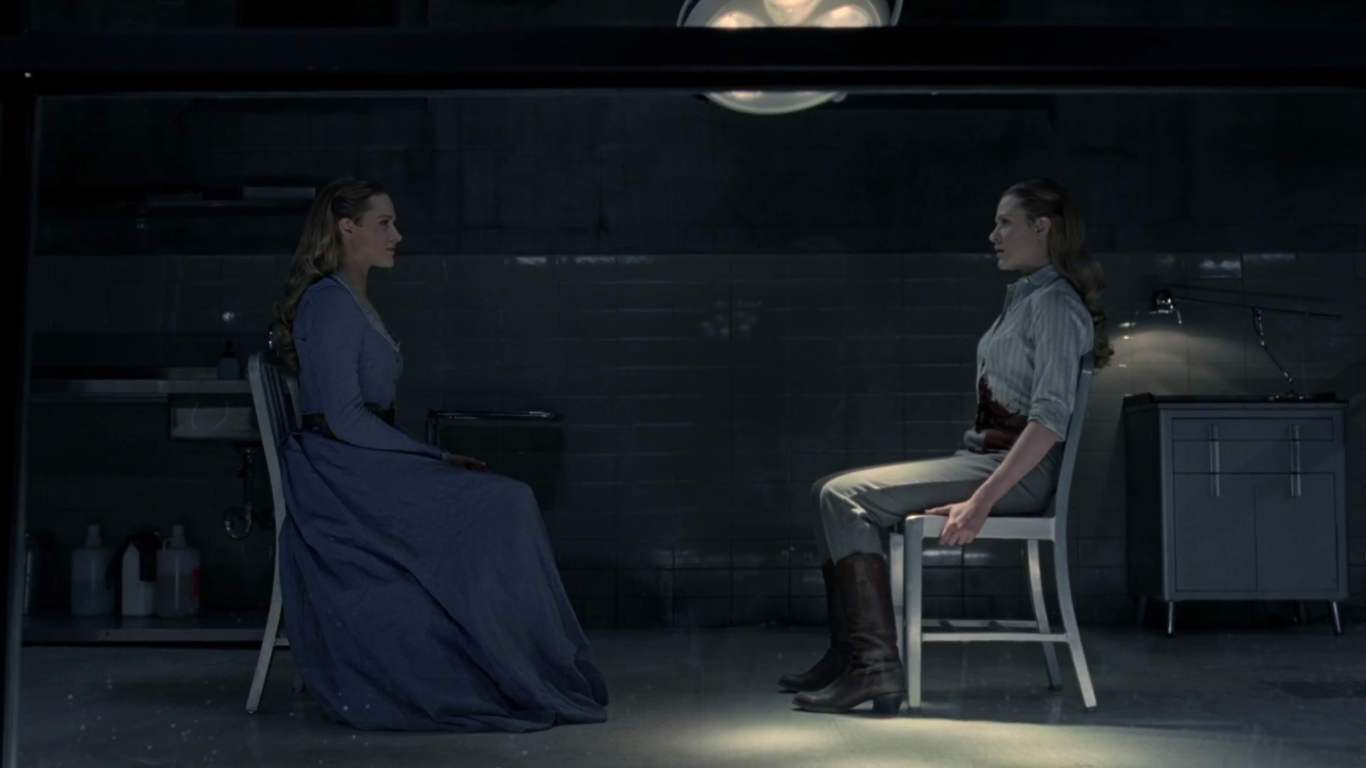
[For Westworld‘s “The Bicameral Mind” or any other recaps on Fetchland, assume the presence of possible spoilers.]
HBO Summary:
Ford unveils his bold, new narrative; Dolores embraces her identity, Maeve sets her plan in motion.
If you’ve read some of the articles out there, perhaps in Vanity Fair or on Vulture.com, you likely had specific questions for this episode. Is the Man in Black actually William? How many timelines are there, anyway? We brought these inquiries to the season finale of Westworld, “The Bicameral Mind” along with a few others. Luckily, they were mostly answered and the finale was gripping even if it was also pretty darn dark.
The episode opens as Arnold welcomes Dolores into the world for the first time. She’s wearing only part of her skin at this point and it’s reminiscent of “Ex Machina”, which we think is on purpose. Foreshadowing. “Ex Machina” is about a brilliant man-of-science who makes a robot that’s virtually indistinguishable from a human. It doesn’t end well for that man or likely for mankind in general.
Robert Ford tells everyone throughout season one of Westworld that destruction is an essential element of being human. In fact, he says Westworld only exists because humans already destroyed everything else on the planet. The park gives humans a much-needed playground to wreak havoc to their hearts delight. Thus, in the world of artificial intelligence, to create a human is to create destruction. A creator of AI has truly “succeeded” at re-making humanity when they’ve created a killer.
This appears to be Ford’s vision, though not necessarily Arnold’s. Arnold seems to care more about what’s happening inside his hosts. He doesn’t like for them to suffer. The fact that they may develop consciousness terrifies him because it means they truly feel and understand their own suffering. Ford, on the other hand, cares about the outer world and consequences more. He’s a bottom line kinda guy.
There’s a lot of talk in Westworld about the gods of this world, ownership, and control. The story revolves around power for many of the characters; especially The Man in Black, Maeve, Dolores, Arnold, Charlotte, and Ford. In fact, this power-hungry-control-freak list points out our favorite thing about Westworld. It’s gender-balanced. Also, nobody is better or worse than anybody else when it comes to winning and losing. Those who think they’re superior usually pay a steep price soon after their declaration of it. The show keeps reminding us that all this comes and goes; including power and control. It’s a swiftly changing world and thus staying on top is temporary.
One poignant question the finale explains is that brutal beatdown at Escalante where seemingly everybody dies. We’ve seen it referenced many times in the season. Dolores hovers on the outskirts while Teddy and Wyatt kill every single person in town. This is what we’ve always seen. It’s a massacre. “The Bicameral Mind” reveals, however, that Dolores isn’t on the outskirts at all. In fact, she’s the whole shebang. The entire Escalante event was manufactured by Arnold, though. After he put Dolores through the maze of his creation, she did indeed find consciousness. Thus Arnold knew she could truly suffer. That means the other hosts would soon follow the same course and develop consciousness.
To put conscious beings who suffer and are aware of their suffering in a playground made to torture and destroy them is cruel, Arnold concludes. He enters a shame spiral and wants to die. Arnold was the agent of this cruelty, so he feels guilty. This is why he wants to end all the host suffering as well as his own. That means he needs to kill all the hosts. Then they won’t suffer. So, Arnold uses Dolores as his agent for this – thus the Escalante massacre. This story arc also reveals one of the many gender swaps Westworld employs, it turns out Wyatt is simply Dolores. In fact, just a small part of her is Wyatt. She’s THAT powerful.
Meanwhile The Man in Black continues to think he’s all that matters. He informs Dolores that she should be heartbroken because it turns out he’s her beloved, William all grown up. Thus nobody is coming to save her after all. Sure, it smarts a bit, but Dolores gets over it pronto. You know why? Because, just like with everything else in Westworld, William/The Man in Black isn’t as significant as he believes. Sure he owns the park on paper. He’s got the most shares and is the most powerful board member. But just like all those shareholders who “own” things like energy futures… it’s a willow wisp sort of ownership. He actually has very little power and control beyond what the game allows.
This lack of significance hammers The Man in Black throughout the season when he’s constantly told, “The maze isn’t for you”. It’s really not. The maze is for the hosts. It’s an inner journey to their consciousness. The Man in Black is only capable of surface BS games. He only understands what he can see and kill and dominate – things outside himself. This is why there are never any real stakes for him in Westworld… at least not until the end of the finale, anyway. The very source of his frustration is the thing he refuses to face. After all, The Man in Black is just human – a stubborn, unchangeable human.
Meanwhile the changeable and non-human host, Maeve, has the control panel to the park security system and her troops in line. She’s ready to roll. The plan goes into action when Armistice bites the finger off the technician who works on her face. Armistice is that badass bandit who tattoos a red snake all over her body using the blood of her enemies for the ink. She beats him and throws her now-nine-fingered technician through a glass wall.
Then, in our favorite gender flip of the season, it’s Armistice who comes to Hector’s rescue. At the crucial moment when another technician is about to sexually assault Hector, Armistice bursts in to save him. Maeve joins them afterward and the trio confront Maeve’s favorite technicians, Sylvester and Felix. With help from Armistice’s rough manhandling, they get Sylvester to admit somebody knows about their plan, it’s someone with an access code called “Arnold”.
In Ford’s new narrative we see Teddy save Dolores from The Man in Black. He plays hero and finally takes her to where the mountains meet the sea. Teddy made this promise a million times but never kept until now. The old story ends then, like all tragic romances, as Dolores dies in Teddy’s arms. Sunlight glistens on the water behind them as the day ends in a gorgeous sunset. The music swells to a tearful crescendo. Teddy declares that maybe this is somehow actually a new beginning. Ford has thus introduced his new narrative. His new beginning comes right at the old narrative’s tragic climax. So, Ford points out the nature of life as an eternal loop yet again. He then instructs technicians to clean up Teddy and take Dolores to the “old field lab”. Her work has just begun.
Meanwhile Maeve and her team encounter Bernard in the back warehouse and she has Felix fix him. He did indeed shoot himself, as Ford had instructed. But Felix tinkers around and brings Bernard back online. Maeve then asks Bernard to remove the memories of her daughter but he says he can’t because they’re part of her consciousness now and to destroy them is to destroy a critical part of her structure. She can’t learn from her mistakes if she can’t remember them, he explains.
Maeve then asks Bernard who altered her code under the name “Arnold” and he points out that her escape plan was programmed to happen. It’s all right there on the control panel for her to see. She’s still being controlled. Maeve calls BS, though, and says it’s she who’s in control. Nobody else. It’s a human trait, this stubborn refusal to see the facts right before her. Maeve attempts to deny her humanity at every turn but she’s certainly the most human host in Westworld.
Then there’s a system breakdown in the back lab. A red light pulses in the otherwise pitch dark space. An alarm sounds continually. Maeve and her team are undeterred by it, though. They continue their escape plan and Felix follows along like a puppy-in-love. Hector and Armistice battle their way out with ease. Guns blazing and witty remarks flying, they even seem to have fun with it. The duo done this sort of thing a zillion times.
But then Armistice gets her arm caught in a hardcore computerized security door. She’s trapped. Hector helps Maeve and Felix get to their escape elevator, though. When Maeve gets into the elevator, ready to leave for good, she bids Hector farewell and tells him he can’t come with her. Maeve has always valued her independence, she explains. So, Hector says, “See you in the next life,” and the doors close on him. She’s on her way.
Next Ford explains the whole story to Bernard and Dolores in the old field lab. Arnold made Dolores conscious by running her through the maze. It was a technical success but then he didn’t want to torture the hosts with consciousness and reverie. Arnold knew that after the Escalante massacre, Ford could just bring all of the hosts back. But he couldn’t bring back his beloved human partner. So Arnold had Dolores shoot him along with Teddy and herself. They’d also merged Dolores with a new character named Wyatt, Ford continues to explain. So, now Dolores and Bernard understand the scope of their adventure. All those wiped memories are now conscious for them.
After his explanation, Ford hands a child’s maze game that’s exactly the Westworld maze emblem to Bernard. He says he knows how to save Bernard, something even Arnold couldn’t do. It turns out Ford learned about the horrors of the hosts having consciousness soon after Arnold’s death. In fact, it was the suffering he endured at the loss of his beloved Arnold that taught him this. Ford tells Bernard he knows how to save him from this place but that, unfortunately, he’ll have to suffer more first. Then Ford also gives Dolores the gun she used in the Escalante massacre. It’s an old times sake, Wizard-handing-out-goody-bags-at-Oz kinda dynamic. You had the maze inside you the whole time!
One of the things Ford tells Bernard and Dolores during this long explanatory session is that the park probably should have fallen apart with Escalante. In fact, it likely would have except that Dolores had just hooked William into his Westworld obsession at that point. William thus invested all his company’s money into owning and rebuilding the park. Then years later he came back to search for the center of the maze like an addict seeking a fix. If William hadn’t done that, Ford presumes, it might not have been possible to rebuild the entire park from scratch as they did after the Escalante massacre.
This explains why The Man in Black has such a strong sense of entitlement and ownership over the park. But truth is that he’s more like a sperm donor with hundreds of biological children than he is a true father to Westworld. Yes, he played a crucial role and it might not exist without him. But that doesn’t mean everything in the park is about him or owes him anything. In fact, he’s rather insignificant in the overall Westworld picture now. Like they all keep telling him, “The maze wasn’t meant for you”. Fact is, he’s just a guest that spent more money at a critical time.
Maeve rides the exit elevator with Felix. He found where her daughter lives now in Westworld and hands her the info on a slip of paper. But Maeve says that little girl never really was her daughter anyway. Just like she never was whatever they made her to be. If that’s so, what does Maeve think she is? A blank slate? She continues out of the park with a determined look on her face. Before she goes, Maeve tells Felix he makes a terrible human being and that she means it as a compliment.
But, honestly, Felix is 100% human. He’s just a particularly loving and empathetic human being. That’s as human as any of the violent and cruel people Maeve has met before. In fact, many would call those vicious types animals and people like Felix the more truly human. It’s just Maeve’s unlucky circumstance that most humans with empathy and love as peak traits don’t likely visit Westworld. So, Maeve is unfamiliar with them. To her Felix is an anomaly.
She sits on a train that’s headed out of Westworld awhile. As she waits for the train to leave, Maeve sees a mother and daughter in the seat across from her. This touches something in her and she gets off the train to go back into the station. Maeve’s about the re-enter the park but then everything at Westworld shuts down. She’s stuck in the station – just outside. Maeve’s got the piece of paper with her daughter’s location in her hand and she’s looking at the entrance but there’s no way inside while it’s shut down. We then see that Westworld is shutting down bit by bit. The warehouse of zombie hosts is empty. Where are they now?
Next, in a familiar scene that takes place in every episode of Westworld, we see Bernard interview Dolores yet again. But then it turns out Bernard isn’t really with her at all. He appeared to be facing across from her in a duplicate chair. But, in fact, the voice she’s been hearing all this time wasn’t Bernard, nor Arnold. It wasn’t even Ford. Dolores has just been talking to herself all along. She sees herself in the chair and realizes the only voice in her head is her own. This is self consciousness. It’s a journey inward, after all. So, all those times Dolores thought she was listening to Arnold she was actually just being conscious and hearing her own inner dialogue. This is what the phrase “The Bicameral Mind” means. It’s a psychological theory about our voice in our head.
This brings us to the final scene. Ford gives a speech at the gala. The Man in Black is there along with the rest of the Westworld board and employees. He talks about storytelling and becoming who we dream to be. Ford calls Westworld a prison of our own sins, speaking of humans. He says humans can’t change. Ford explains that he realized someone was watching all along who was capable of change, though. So, he wrote a new story for them. His new narrative “…begins in a time of war, with a villain named Wyatt and a killing. This time by choice,” Ford says.
Then Dolores joins the gala with the gun Ford gave her from the Escalante massacre behind her back. She’s in the blue dress of yore and walks up behind Ford who’s still speaking to the gala attendees. Without hesitation or comment, Dolores shoots Ford in the back of the head. Then the zombie hosts arise out of the woods and start killing guests, just as Dolores does. She’s a crackerjack shot, remember? Humans are falling to the ground. It’s another massacre. The Man in Black smiles, seemingly delighted, when he gets shot. Finally something is real in Westworld. Of course… he might also die as a result. So, the rules have changed now. Suddenly everything is at stake just as the story ends.
After the credits roll we get a quick glimpse of Armistice cutting her arm out of the door where she’s been stuck. She smiles and begins to fight again. The battle wages on, a war just like Ford said.
In the end we’re drawn back to thinking about Maeve. The most human of hosts, she asked Bernard to remove her daughter’s memories right before exiting the park. He wouldn’t do it, though. He said memories are a crucial part of her structure and how could she learn from her mistakes without memories? It’s the memory of her daughter that brings Maeve back into Westworld. So, was leaving a mistake?
The fact that this was her final choice of the season makes Maeve, yet again, the most human of hosts. It also points to her as one of those Ford was talking about when he said, “Some are capable of change”. In fact, she is perhaps the most changed of all the characters on the show. Even if she is right back where she started in her return to Westworld, Maeve’s also a whole new character now. Just like in Ford’s narrative, the show ends with a new beginning. But the beginning of what? We can’t wait until season two to find out.
– Katherine Recap





